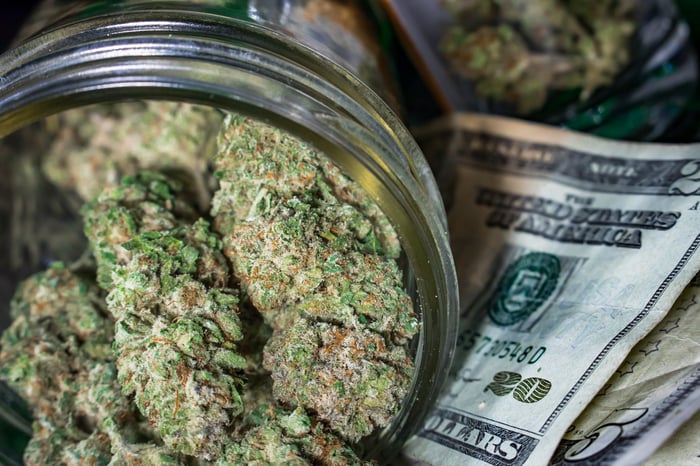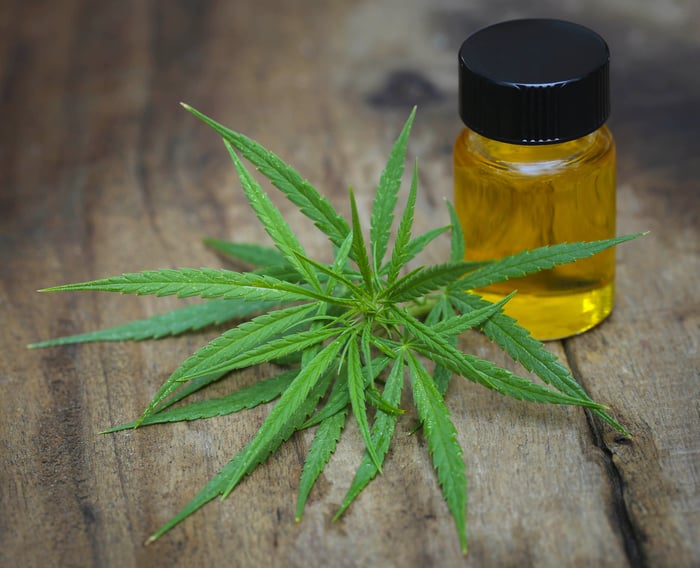The cannabis industry is growing by leaps and bounds, and Wall Street has taken notice. Over the trailing-two-year period, a majority of pot stocks have vaulted higher by triple- or quadruple-digit percentages. The expectation that Canadian recreational legalization is around the corner, as well as a discernible shift in the public's opinion toward marijuana, are fueling valuations ever higher.
But even with its lofty growth prospects, investors could make the case that valuations in the marijuana industry are far too high (pun fully intended).

Image source: Getty Images.
But that's not the case for all marijuana stocks. There's one that's consistently stood out from the crowd for its reasonably low forward price-to-earnings ratio and PEG ratio that's well below 1 (any figure below 1 is considered "cheap"). And it just so happens that this "marijuana value stock," better known as OrganiGram Holdings (OGI 3.16%), reported its second-quarter operating results last week, delivering a record quarterly profit. Let's dig into what current and prospective investors should be excited about, as well as the one creeping fear all pot stock investors should have.
OrganiGram's strong second quarter
With the medical cannabis market expanding in Canada -- medical marijuana has been legal since 2001 -- and the country presumed to be moving toward adult-use legalization by this summer, it shouldn't surprise too many people that OrganiGram generated record sales and profits in the second quarter.
Gross sales for the quarter catapulted higher by 123% to $2.51 million as the number of registered medical patients increased to 13,000. What was particularly notable was how OrganiGram achieved these record sales. Dried cannabis flower volume increased by just 65% from the prior-year quarter. Meanwhile, cannabis oil sold jumped by 297% to 662,000 milliliters from 139,000 milliliters in Q2 2017. Cannabis oil has a significantly higher price point than dried cannabis, but margins are much juicier, which is what's helped push OrganiGram's bottom line into the black.
In terms of profit, OrganiGram produced 1.08 million Canadian dollars ($840,000 U.S. dollars), which worked out to about $0.01 per share. While this may not seem like much, it's an indication of how big a role oils are playing in boosting margins amid a long-haul capacity expansion. It also doesn't hurt that the company had record yields from its crop in the recently ended quarter, and it expects production costs to hit another record low in the sequential third quarter.

Image source: Getty Images.
The company also ended its latest quarter in much better position financially than the year-ago period. Following an equity financing that closed in December, and a convertible debenture offering that closed at the end of January, its balance sheet boasts $41.4 million in cash and $96.7 million in short-term investments. Said CEO Greg Engel, "[We] have also significantly bolstered our balance sheet and from an operational and sales and marketing perspective we are well positioned to take full advantage of not only the medical market but also the burgeoning adult recreational and international opportunities as well."
In other words, it has more than ample capital to make its four-phase expansion -- which will increase its annual production to 113,000 kilograms of cannabis a year -- come to fruition.
Looking ahead, OrganiGram anticipates an annual run rate of about 36,000 kilograms of cannabis by June 1, with the company providing a more detailed brand strategy for Canada's expected recreational pot legalization by mid-May.
This still remains a significant concern
Even though OrganiGram continues to deliver strong growth, has a forward P/E of less than 28, and an author-estimated PEG ratio of around 0.5 -- all metrics that should have the full attention of value and growth investors -- it still falls victim to the silent killer of pot stocks: dilution.
One of the biggest issues with the marijuana industry is that its access to financing is limited. Aside from Uruguay, cannabis is still illegal in every other country around the globe, meaning financial institutions could face monetary or criminal penalties by providing basic banking services to marijuana companies. This leaves them with few choices to raise capital.

Image source: Getty Images.
In Canada, the most popular way of raising capital is through bought-deal offerings. This is where common stock, convertible debentures, stock options, and/or warrants are offered in exchange for capital, prior to the release of an official prospectus. While bought-deal offerings have been wildly successful in raising capital for the cannabis industry, they're also bad news for existing shareholders. This means of raising capital leads to an increase in a publicly traded company's outstanding share count, diluting the value of each existing share. Additionally, it can make it tougher for publicly traded companies to deliver meaningful per-share profits.
And, as icing on the cake, the warrants and options that often accompany these deals, or the compensation packages of executives of the company, can balloon share counts for years to come.
According to its second-quarter filing, OrganiGram's Canadian listing had a weighted average of 131.9 million shares outstanding on a diluted basis. Comparatively, this is 36% higher (almost 35 million shares) than its weighted-average share count in Q2 2017. Mind you, the company recently completed an almost $90 million convertible debenture offering where these notes could be converted to common stock down the road. There were also more than 8.1 million warrants outstanding as of Feb. 28, 2018.
Long story short: Even the marijuana industry's closest thing to a value stock isn't impervious to the impacts of dilution over time. This is something that prospective and current investors are going to want to keep in mind when analyzing OrganiGram.





